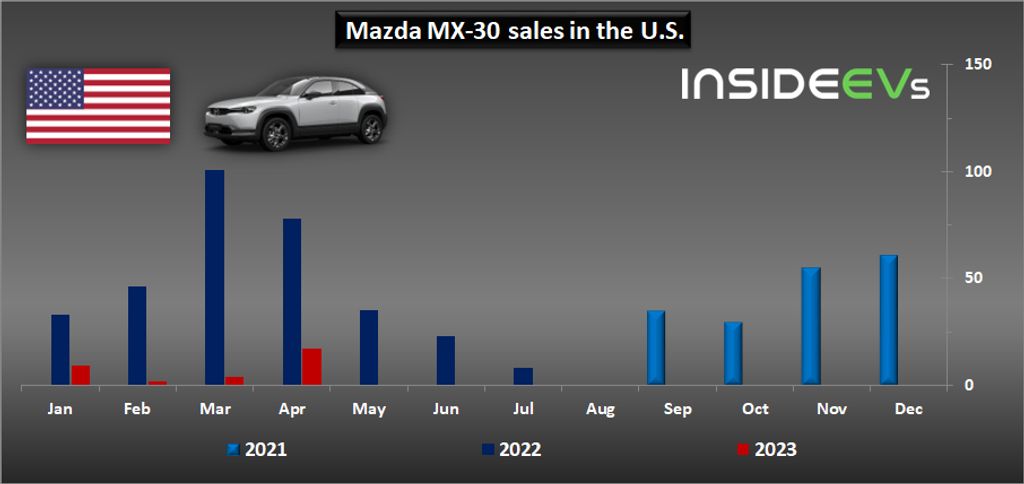Mazda North American Operations reports that its vehicle sales in the United States, increased in April by 7.5 percent year-over-year to 32,351. During the first four months of the year, the company sold 120,735 units, which is also 7.5 percent more than a year ago.
In other words, the Japanese brand is doing relatively well – something that we can’t say about its all-electric car sales.
In April, Mazda sold 17 all-electric Mazda MX-30s, which is 78 percent less than a year ago (78 units) and just a marginal 0.1 percent of the brand’s total volume.
The only positive thing that we can find is that April was the best month for the 2023 model year version so far and the best result for the model in 10 months.
So far this year, Mazda sold 32 MX-30 in the US (actually only in California), which is nearly 88 percent less than a year ago at this time (258). It remains a really low volume even for compliance purposes.
We don’t know whether the low sales relate solely to limited supply or if the cars are available but demand is weak (especially since the car is not eligible for the $7,500 federal tax credit). It might be a combination of all three reasons.
It seems that Mazda is a rare premium brand that was unable to sort out its electrification strategy to achieve at least a few percent BEV share in the total sales, like many of its competitors.
As far as we understand, such a state can’t be prolonged forever. Mazda plans to electrify its lineup with more BEVs around 2028-2030, but as of today, most of the other premium brands are far ahead in terms of BEV sales. Meanwhile, Mazda’s representative said that long-range BEVs aren’t sustainable.
The Mazda MX-30, priced at an MSRP of $34,110 (plus a $1,275 destination charge) and EPA Combined range of just 100 miles, without the eligibility for the $7,500 federal tax credit is not expected to make any splash.
Just to illustrate the price/performance competitiveness, let’s take a look at the table with some of the other BEVs:
| Model | Base Price | Dest. Charge | Tax Credit | Effective Price |
| 2023 Chevrolet Bolt EV 1LT 17-inch | $26,500 | +$995 | $7,500 | $19,995 |
| 2023 Chevrolet Bolt EUV LT 17-inch | $27,800 | +$995 | $7,500 | $21,295 |
| 2023 Ford Mustang Mach-E Select SR RWD 18-inch | $45,995 | +$1,500 | $3,750 | $43,745 |
| 2023 Hyundai Kona Electric 17-inch | $33,550 | +$1,335 | N/A | $34,885 |
| 2023 Mazda MX-30 18-inch | $34,110 | +$1,375 | N/A | $35,485 |
| 2023 MINI Cooper SE Hardtop 2 door (only higher trim) |
$34,225 | +$995 | N/A | $35,220 |
| 2023 Tesla Model 3 RWD 18-inch | $40,240 | +$1,640 | $3,750 | $38,130 |
| 2023 Volkswagen ID.4 Standard 19-inch | $38,995 | +$1,295 | $7,500 | $32,790 |
| 2023 Volvo C40 Recharge 19-inch | $55,300 | +$1,095 | N/A | $56,395 |
| Model | Drive | Battery (kWh) |
EPA Range |
0-60 mph (sec) |
Top Speed |
| 2023 Chevrolet Bolt EV 1LT 17-inch | FWD | 65 | 259 mi (417 km) |
6.5 | |
| 2023 Chevrolet Bolt EUV LT 17-inch | FWD | 65 | 247 mi (397 km) |
7.0 | |
| 2023 Ford Mustang Mach-E Select SR RWD 18-inch | RWD | 70* | 247 mi (397 km) |
5.8 | |
| 2023 Hyundai Kona Electric 17-inch | FWD | 64 | 258 mi (415 km) |
104 mph (167 km/h) |
|
| 2023 Mazda MX-30 18-inch | FWD | 35.5 | 100 mi* (161 km) |
87 mph (140 km/h) |
|
| 2023 MINI Cooper SE Hardtop 2 door (only higher trim) |
FWD | 32.6 | 114 mi (183 km) |
6.9 | 93 mph (150 km/h) |
| 2023 Tesla Model 3 RWD 18-inch | RWD | 60* | 272 mi (438 km) |
5.8 | 140 mph (225 km/h) |
| 2023 Volkswagen ID.4 Standard 19-inch | RWD | 62 | 209 mi (336 km) |
7.1 | |
| 2023 Volvo C40 Recharge 19-inch | AWD | 78 | 226 mi (364 km) |
4.5 | 112 mph (180 km/h) |
* estimated/unofficial values (net capacity in the case of Ford, unknown number in the case of Tesla).
In January, the company introduced in Europe the Mazda MX-30 e-Skyactiv R-EV plug-in hybrid (series hybrid with a 17.8-kilowatt-hour battery and recharging capability). This version is not available in North America – although there is a possibility, according to some reports).


